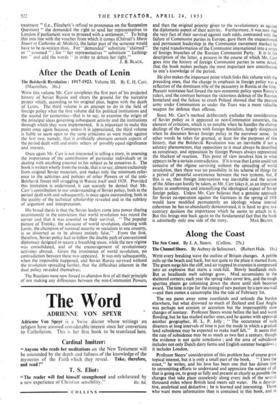After the Death of Lenin
The Bolshevik Revolution : 1917-1923. Volume 111. By E. H. Carr. (Macmillan. 36s.) WrrH this volume Mr. Carr completes the first part of his projected history of Soviet Russia and clears the ground for the narrative proper whidh, according to his original plan, begins with the death of Lenin. The third volume is an attempt to do in the field of foreign policy what the first volume did for political institutions and the second for economics—that is to say, to examine the origin of the principal ideas governing subsequent activity and the institutions through which they were implemented. It is important to make this point once again because, unless it is appreciated, the third volume is liable to seem open to the same criticisms as were made against the first two, namely, that it artificially abstracts certain aspects of the period dealt with and omits others of possibly equal significance and interest.
Once again Mr. Carr is not interested in telling a story, in assessing the importance of the contribution of particular individuals or in dealing with anything external to his subject as he conceives it. The book is written wholly from the inside, that is to say, almost exclusively from original Soviet materials, and makes only the minimum refer- ence to the activities and policies of other Powers or of the anti- Bolshevik forces still struggling in Russia itself until 1920. Provided this limitation is understood, it can scarcely be denied that Mr. Carr's contribution to our understanding of Soviet policy, both in the period dealt with and subsequently, is once again outstanding, both in the quality of the technical scholarship revealed and in the subtlety of argument and interpretation.
His broad thesis is that the Soviet leaders came into power sharing unanimously in the conviction that world revolution was round the corner and that it was essential to their survival. " The popular picture of Trotsky, the advocate of world revolution, clashing with Lenin, the champion of national security or socialism in one country, is so distorted as to be almost entirely false." From the first. therefore, Soviet policy had to follow the double path of conventional diplomacy designed to secure a breathing space, while the new regime was consolidated, and of the encouragement of revolutionary activities abroad. Given the imminence of world revolution, no contradiction between these two appeared. It was only subsequently, when the impossible happened, and Soviet Russia survived without the revolution spreading further, that the difficulties inherent in the dual policy revealed themselves.
The Russians were now forced to abandon first of all their principle of not making any differences between the non-Communist Powers, and then the original priority giien to the revolutionary as against the diplomatic aspect of their activity. Furthermore, it was now that the very fact of their survival against such odds, contrasted with the failure of Communist parties in Europe, gave them the unquestioned and permanent leadership in the Communist movement marked by the rapid transformation of the Communist international into a series of foreign branches of the Russian Communist Party. It is in his description of the latter, a process in the course of which Mr. Carr goes into the history of foreign Communist parties in some detail, that the book makes perhaps the most important new contribution to one's knowledge of the period.
He also makes the important point which links this volume with the preceding ones, that the change in emphasis in foreign policy was a reflection of the dominant role of the peasantry in Russia at the time. Peasant resistance had forced the new economic policy upon Russia's rulers, and the contrast between the victorious defence of the Russian homeland and the failure to crush Poland showed that the peasant army under Communism as under the Tsars was a more valuable weapon for defence than offence.
Since Mr. Carr's method deliberately excludes the consideration of Soviet policy as it appeared to non-Communist countries, the element of criticism, which is so notable when he handles the clumsy dealings of the Comintern with foreign Socialists, largely disappears when he discusses Soviet foreign policy in the narrower sense. In other words he takes for granted, at least for the purposes of this history, that the Bolshevik Revolution was an inevitable if not a salutary phenomenon, that opposition to it must always be described as conspiracy, and opposition by foreign Powers always represented the blackest of reaction. This point of view involves him in what appears to be a certain contradiction. If it is true'that Lenin could not conceive of the regime surviving without the spreading of world revolution, then there was no possibility in his scheme of things for a period of peaceful co-existence between the two systems, but, if this is so, then foreign intervention was inevitable and the action of the Allies can hardly be taken, as Mr. Carr takes it, as an important factor in confirming and intensifying the ideological aspect of Soviet foreign policy. Unless Mr. Carr believes that a genuine approach for Soviet co-operation against the Germans in the spring of 1918 would have modified permanently an ideology whose internal coherence he has so abundantly demonstrated, it is hard to give to a contrary decision the importance which he seems to attach to it. But this brings one back again to the fundamental fact that the book is admittedly only one side of the story. MAX BELOFF.


































 Previous page
Previous page